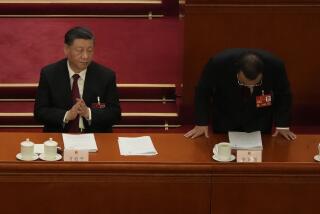Hong Kong Business Leaders See Life After 1997 : Asia: Several Chinese tycoons are promoting an optimistic view of what will happen after the governing changeover.
- Share via
Banking tycoon David K.P. Li is tired of listening to people deliver post-mortems on Hong Kong as the world knows it.
So Li and several of Hong Kong’s most powerful Chinese leaders have started promoting their own, distinctly non-British, view of the upcoming marriage between Hong Kong’s freewheeling capitalistic traditions and China’s huge developing economy.
Their optimism about Hong Kong’s future is based in part on the number of Chinese overseas, who have been a major source for capital, technology and brainpower for mainland China. They are convinced that the Chinese government will not jeopardize this unique opportunity to capitalize on the money and talents of the 55 to 65 million Chinese who are spread throughout the world.
Li pointed out that in Thailand, Chinese make up 8% of the population and own 80% of the country’s commercial assets and half the banks. In Indonesia, they make up 4% of the population and own 75% of the assets.
“The only way to unite them is through Hong Kong,” he said last week in Los Angeles, where he spoke at a seminar sponsored by the Asian Business League of Southern California. “China not only wants their overseas capital, but they also want their links to the outside world.”
Li, who is British-educated and well-connected, is chief executive of the Bank of East Asia and a director of such multinational giants as IBM, Rolls-Royce and German industrial conglomerate Daimler-Benz. He says: “We felt Hong Kong needed to be promoted as a business and financial center after 1997.” He and the other founders of the Better Hong Kong Foundation are investing millions of dollars in a campaign to take their message to the rest of the world. The muscle-flexing of this group of Hong Kong Chinese leaders, whose elite membership includes the likes of billionaire real estate developer Li Ka-shing and movie mogul Sir Run Run Shaw--exemplifies the dramatic transformation taking place as 1997, when Britain will hand over Hong Kong to China, draws near.
Old colonial institutions are getting new names. New Chinese organizations are being formed. And different voices are emerging to speak on behalf of the longtime British colony.
In recent months, media coverage of Hong Kong has been dominated by squabbles between the British and the Chinese over the terms of the changeover, the surprisingly strong showing of Beijing’s critics in last month’s legislative election in Hong Kong, and growing concerns that Hong Kong’s economy is already being undermined by corruption that has jumped the border.
Li, whose family helped found the Hong Kong-based Bank of East Asia in 1918, argues that these controversies have overshadowed the fact that the Hong Kong economy continues to be strong and that it will play a key role as a gateway to a greater China economy whose purchasing power is predicted to surpass that of the United States by the year 2002.
He said that a growing number of former Hong Kong residents who left for the United States, Canada and Australia are returning. The Hong Kong government estimates that 12% of the people who emigrated since 1982 have returned.
“There is a reverse brain drain going on now,” he said.
Li and others argue that China’s Communist leaders, who themselves now rank among some of Hong Kong’s biggest investors and property owners, have too much at stake not to uphold their 1984 promise to allow Hong Kong to operate as a capitalist enclave for 50 years after the changeover.
Li helped draft the basic law that outlines the “one country, two systems” policy under which Hong Kong will exist as a part of China after 1997.
“We will continue to enjoy the freedoms we have,” he said. “I just don’t think the Chinese like the British to force them to give Hong Kong those freedoms. When China takes over, they will give us those freedoms on their own.”
Li argues that the British government has gone too far in its recent squabbles with the Chinese over the protection of political freedom in the colony after 1997. China has threatened to disband the 60-member Hong Kong legislature because Hong Kong Gov. Chris Patten amended the rules to make it a more democratic organization. He calls the British hypocritical for casting themselves as the liberators of the Hong Kong people after having enjoyed more than a century of running Hong Kong in the best--or worst--of colonial traditions.
“Only in the last few years have they talked about democracy and freedom,” he said.
More to Read
Sign up for Essential California
The most important California stories and recommendations in your inbox every morning.
You may occasionally receive promotional content from the Los Angeles Times.













